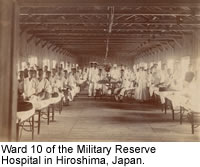American Angels of Mercy: Dr. Anita Newcomb McGee's Pictorial Record of the Russo-Japanese War, 1904
The Red Cross in Japan
Founded in 1864, the Red Cross wished to bring the spirit of humanitarianism to warfare by organizing medical and nursing teams to aid soldiers. They also advanced the goal that every civilized society--even warring nations--should respect and care for all those who were wounded and killed in battle, regardless of which side they fought for. All of this was to be achieved through the creation of national and international volunteer societies.
As Europeans and Christians, leaders of the Red Cross assumed that non-Westerners (and presumably non-Christians) would be unable or unwilling to embrace the ideals that they upheld. The activities of the Japanese during the Russo-Japanese War shattered this myth; the organization and conduct of their Red Cross Society actually proved to be a model that Westerners quickly emulated. As early as 1877, Japan had organized a benevolent society to care for sick and wounded troops during the civil war then being fought. Over the next ten years this group transformed into the Red Cross Society of Japan (Nippon Sekijuji Sha). In 1887 the Society, with 100,000 members, became officially recognized by the International Committee of the Red Cross at its annual meeting in Germany.
In 1904, the Japanese Red Cross Society numbered about one million members. This phenomenal growth was due to the direct involvement of the Japanese Imperial Family and the nation's tendency to centralize all organizational activities. As the emperor and the empress participated in general meetings of the Japanese Red Cross, other high-ranking officials and members of the aristocracy were all but required to join the Society. Membership soon swelled across Japanese society. The aristocracy's approval of the Red Cross changed cultural attitudes to women acting as nurses. It had been considered improper for respectable "ladies" to care for wounded soldiers, especially if foreigners or the enemy, but now refined women were expected to carry out nursing tasks to aid the nation. Because of Japanese society's ingrained notions of women's obedience and subordination to men, some observers believed that women made excellent nurses.
Dr. McGee commented that the Japanese Red Cross Society was "characteristic of the nation" and was probably the "finest organization of its kind in the world." Another U.S. military observer after witnessing the situation in Japan, demanded that the American Red Cross be reorganized as soon as possible. In 1905, President Theodore Roosevelt signed a bill into law that empowered the government to reorganize and revitalize the American Red Cross Society which, since its founding in 1881, had been a relatively insignificant charitable society. By World War I, the American Red Cross had become an important organization with strong ties to the military.




